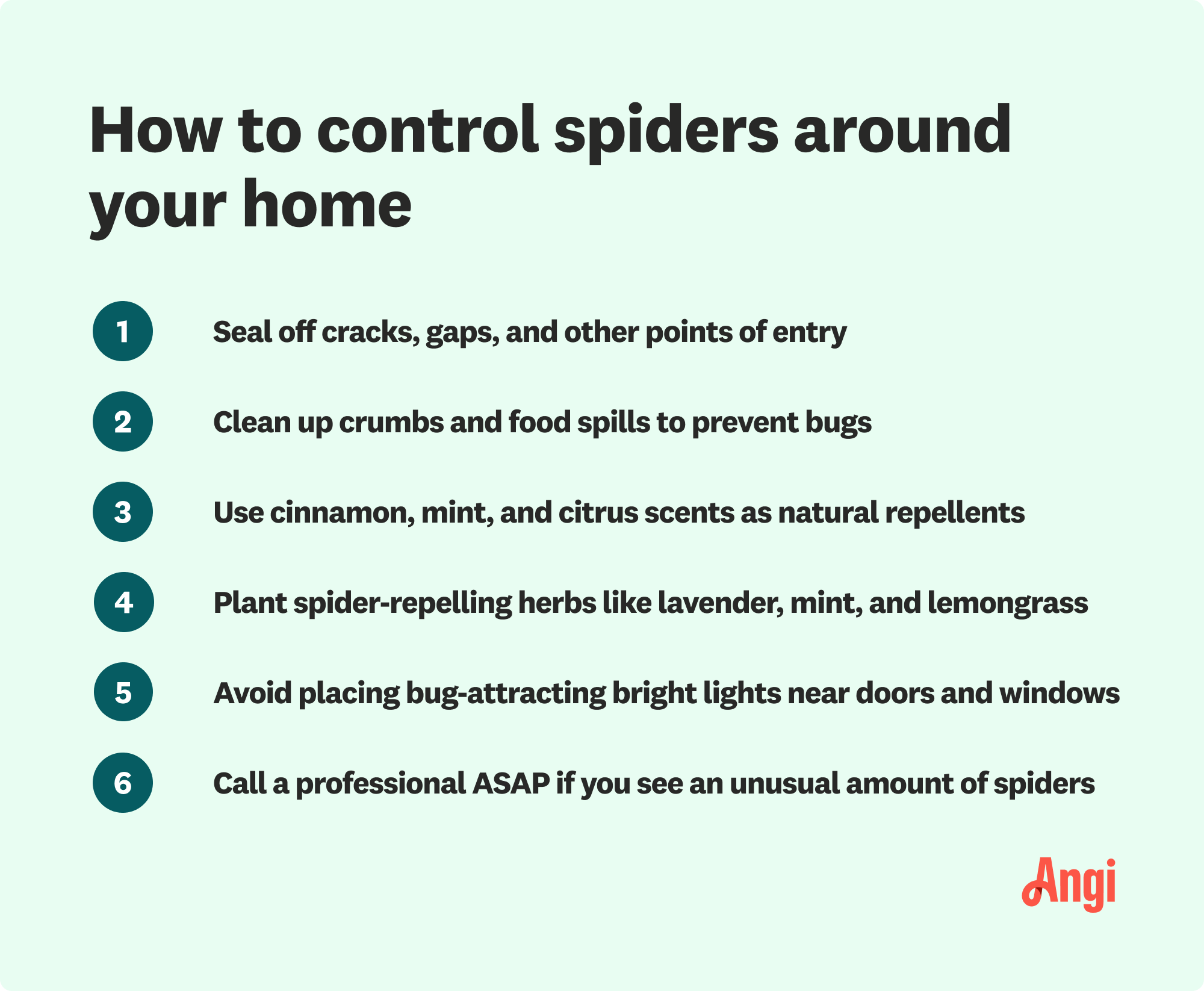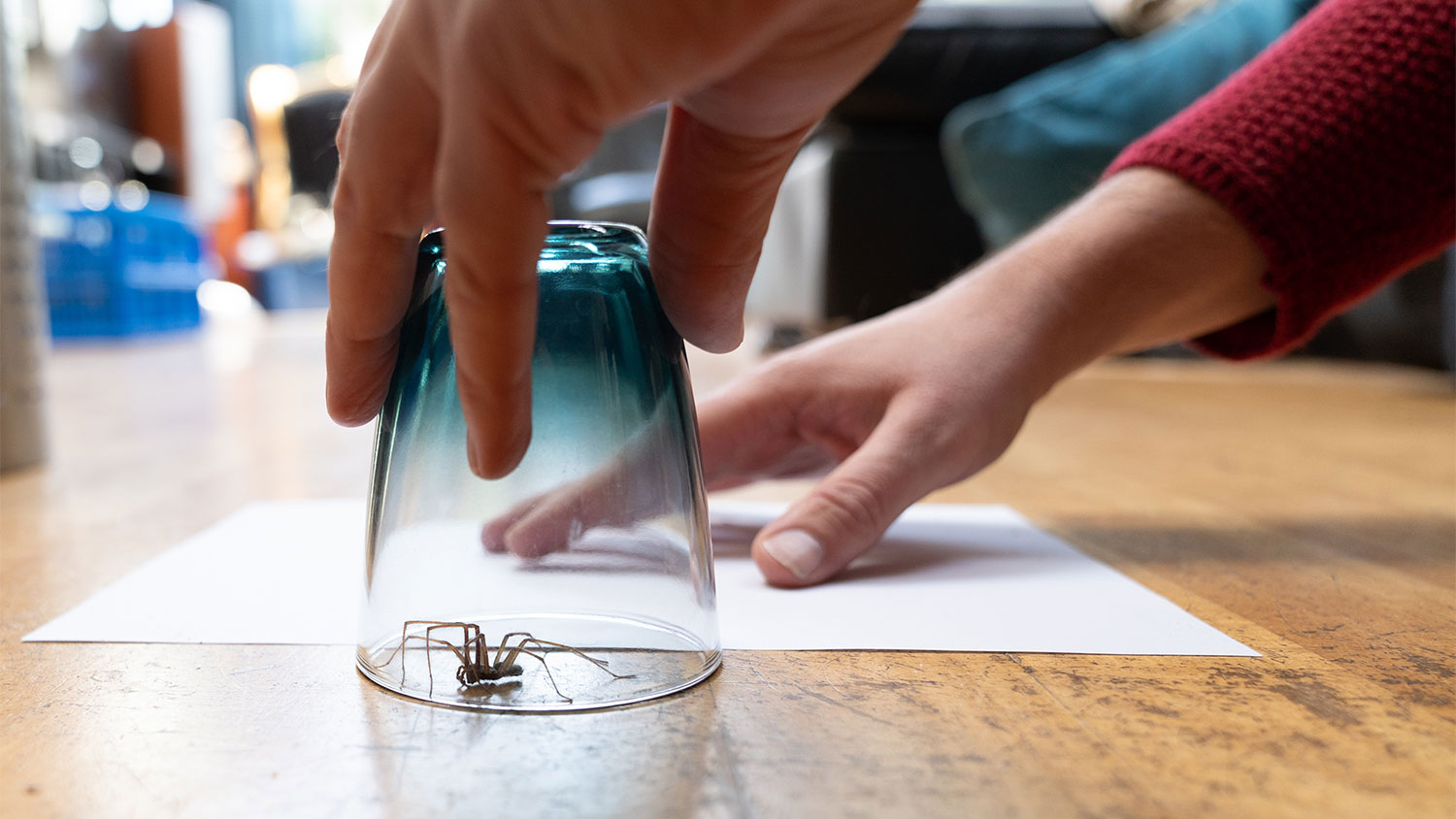
If you discover a wasp nest near your home, you’ll want to remove it ASAP. Learn wasp nest removal cost factors in this guide.
Here’s what to do if some itsy bitsy spiders crawl up the water spout into your home


Seal off entry points like cracks and gaps to prevent spiders from finding their way inside.
Cinnamon, mint, and citrus are natural spider repellents, so try placing these oils in a diffuser.
Rehome spiders rather than eliminate them—they can help keep away other insects.
If your spider problem is out of hand, hiring a pest control company can cost between $300 and $550.
Spiders are handy household helpers—they devour flies, mosquitoes, and tons of other annoying insects. Still, it can be difficult to look past their creepy exterior, and it’s totally fair if you don’t want to share your space.
While there’s no perfect way to “spider-proof” your home, knowing what spiders like (and what their prey likes) can make it way less appealing. Here are the most effective ways to avoid inviting them in.

Spiders are tiny, sneaky, and resourceful—if there’s a way into your home, they’ll find it. They might come in through cracks or gaps around your home, worn or broken window seals, and any other small openings they can find.
To help keep spiders out, take care of necessary repairs that might create a means of entry. It’s also helpful to do regular walkarounds of your home’s perimeter to spot any weak points. As a bonus, this will prevent other pests from coming in as well, and it will help you spot structural issues before they become a bigger problem.
In general, spiders aren’t interested in your PB&J. Spiders are mainly carnivores, much preferring a tasty fly, ant, or moth. Some also like to munch on things like leaves, nectar, and honeydew, but these won’t be enough to hold their interest. If you leave any type of food out, though, they might go after the bugs it attracts.
Keeping your home insect-free eliminates the spider’s main course and their biggest reason for hanging out in your home. Be sure to clean up spills and crumbs as soon as they happen, keep your food in sealed containers, and keep up a regular cleaning routine. That way, there won’t be anything to feed any unwanted guests, whether they have six legs or eight.

Spiders might hitch a ride when you bring in your potted plants for the winter or when you grab an armful of firewood for the fireplace. Whenever you’re bringing something from the outdoors inside your home, give it a thorough inspection for spiders. If you spot one, gently shake it off or leave it alone until it’s gone.
Spiders detect smells using tiny scent-sensitive hairs on their legs, and there are a few scents that they really can’t stand. Try using cinnamon, peppermint, or citrus essential oils in an oil diffuser. You can also add around 20 drops to a spray bottle filled with water and use this as a natural repellent. For a simpler approach, rub lemon or orange peels around your doors and windows.
Keep in mind that these should be used for a bit of prevention, not in the case of active infestations. If you’re worried about how many spiders you’re seeing, it’s best to call in a pro.
Spiders are actually quite beneficial to your garden, as they trap and eliminate a wide variety of crop-destroying insects. However, if you still don’t want them around, there are a variety of plants that spiders tend to hate. These include:
Lavender
Mint (confine this to containers—it grows and spreads quickly)
Lemongrass
Lemon balm (this is another one that you’ll want to keep contained)
Basil
Rosemary
You can also plant these in containers near your doors, on your porch or deck, or in any other spot you’d like to keep spider-free.
While spiders are big fans of the dark, they’re even bigger fans of the delicious insects buzzing around your outdoor lights. If possible, try to keep your outdoor lights to a minimum. At the very least, avoid having them near your doors and windows if you don’t want a spider building its home there.

It’s tempting to get rid of a spider ASAP, often with a vacuum hose or a scrunched-up tissue. However, you shouldn’t kill spiders if you can help it—they’re rarely dangerous to humans, aside from inflicting a painful, usually non-poisonous bite (and the heebie-jeebies, of course). They’re also extremely helpful to have around the house since they make a meal of flies and other pesky insects.
If you’re squeamish around spiders, try the contactless catch-and-release method: Place a glass over them and slide a magazine or stiff piece of cardboard underneath. Then, set the cup down outside, lift it, and allow the spider to scurry away. Cringe and run away yourself, if desired.
It’s normal to have a spider move in here and there. However, if you notice a lot of them, or if you spot any poisonous spiders, it’s likely time to call an exterminator. The same goes for other bugs: Wherever there are bugs, you will likely find spiders setting up shop.
Either way, it’s important to keep potential infestations in check. Get in touch with a local pest control professional to help you evict the bugs and spiders for good.
The most obvious sign that you have spiders is seeing them. If you regularly spot spiders indoors, especially if you see them in different parts of your home and sight more than two or three per day, it may indicate an infestation. Make note of the type of spiders you see, as some can be more problematic than others.
Another clear indicator is the presence of spider webs. Spiders spin webs to catch prey, so if you notice an abundance of webs in and around your home, it's likely there are spiders living there. Look for webs in corners, along windowsills, and in dark, undisturbed areas like basements or attics. Finding spider egg sacs is another sign that you have a spider problem. These small, silken sacs can usually be found near the web or in hidden, sheltered locations.
Pest control costs range between $300 and $550 for one-time service, but it’s worth the price. If you suspect a spider infestation, address the issue promptly—their populations can quickly multiply if left untreated.
Kate Fann contributed to this article.
From average costs to expert advice, get all the answers you need to get your job done.

If you discover a wasp nest near your home, you’ll want to remove it ASAP. Learn wasp nest removal cost factors in this guide.

Keep your home free of termites and the damage they do. Learn more about inspections, infestations, and the average cost of termite treatments.

Budget for the cost of tick extermination services using our helpful cost guide.

Learn how to check for bed bugs in your home, what to do if you find them, and how to prevent them from returning in this handy DIY guide.

Many popular cockroach treatments are harmful or annoying for pets. We’ve collected the alternatives that get rid of roaches without the same dangers.

Mouse droppings left in your home can harm your health. Learn how to clean mouse droppings and dispose of them safely using our complete guide.